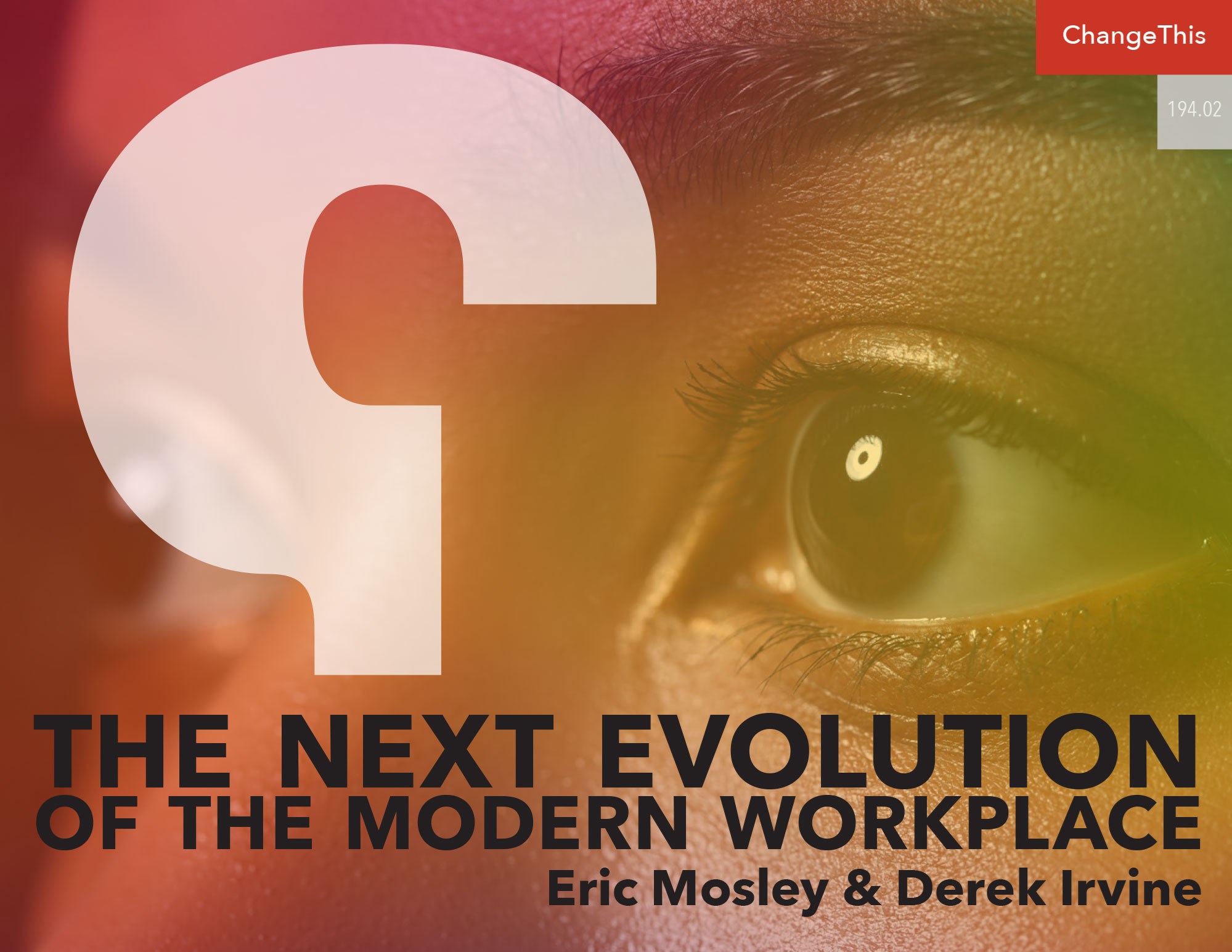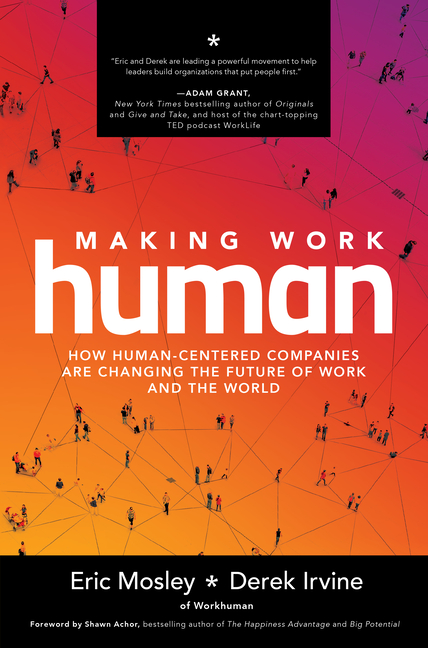The Next Evolution of the Modern Workplace
November 11, 2020
"The future of business depends on work becoming more human, and that’s a powerful impetus toward progress."
On December 10, 1948, the United Nations General Assembly adopted the Universal Declaration of Human Rights.
It’s a brief and noble document, just as relevant today as it was more than 70 years ago. Among the rights listed are those in Article 23, which begins, “Everyone has the right to work, to free choice of employment, to just and favourable conditions of work and to protection against unemployment.”
There are reasons to celebrate the world’s progress since Eleanor Roosevelt led that effort to recognize basic rights for all. Extreme poverty has declined; basic education and healthcare are more widely available; and for all their flaws, modern business and nonprofit enterprises have raised the material well-being of humans at a scale beyond the most optimistic projections of 1948.
Now the time has come for those enterprises to adopt an additional charter that expresses the rights and aspirations of the workforce. We should recognize and declare the enduring, human-centered principles of business and nonprofit enterprises.
WHY NOW?
In 2020, the world faces its worst health crisis in more than a century. COVID-19 spread globally with incredible speed, testing the resilience of people and institutions few had imagined. While we are still learning its lessons, even now we can reflect on the roles businesses play in the crisis.
There are plenty of standards by which to judge the broader impact of an enterprise on society, such as environmental impact or the number of well-paying jobs it creates. In the COVID-19 crisis, we measured impacts in terms like lives saved, and jobs lost and restored. We saw the range of human capabilities, including heroic efforts by healthcare workers.
What’s missing today is a doctrine of standards by which consumers and employees can recognize that a company is using its power to bend the moral arc of the universe just a bit more toward human values.
A NEW WAY FORWARD
Last month my company cast a bold vision for the future of work by introducing the Workhuman® Charter of Workplace Rights. More than a set of standards, it’s a rally cry for all of us to create a more human workplace that springs from a global vision of equity, connectedness, and gratitude. The new rights include:
- The right to do meaningful work
- The right to be appreciated
- The right to work-life harmony
- The right to belong
- The right to grow
- The right to be paid fairly
- The right to privacy
- The right to feel safe and respected
- The right to work in a place that strives to protect the environment
Because the workplace has changed vastly since 1948, the Workhuman Charter of Workplace Rights includes additional rights made essential by developments in business, society, and technology. For example: Everyone’s right to privacy includes the right to “switch off,” or opt out of, the collection of personal data. Everyone has the right to a workplace respectful of mental and emotional safety in addition to physical safety. Marital or parental status cannot be a reason to discriminate among employees; neither can disability nor can genetic information. All people have a right to be respected and to express who they are—for example, their sexual or gender identity, cultural background, or religious beliefs. Sexual harassment, as well as other forms of harassment or intimidation, is not tolerated in the workplace.
The Workhuman Charter of Workplace Rights isn’t only a list of prohibitions. Rather, it casts an aspirational vision of what a workplace can be:
- A place where people deserve to grow to their greatest potential through training, feedback, and rewards
- A place where people feel secure to express their views and ideas, with respect for themselves and others
- A place where people can use their talents and voice for good
- A place that supports environmental, social, and economic sustainability
WHY DO WE CALL THESE RIGHTS?
Why do we call these “rights?” Because employees do. Something big happened in the last 30 years, as the old psychological contract between corporations and employees dissolved. Once, most employees tolerated bureaucracy, inequality, and inauthenticity in exchange for job security. As job security disappeared, people became more mobile out of necessity. They found they had more choices of where and how to work, and who to work with. The most talented, who had the most choices, saw that they didn’t have to leave their principles or personalities at home when they went to work. Leading companies learned that culture was the most important factor attracting talent.
Companies have had to make the case that they are a superior place to work, but society has evolved faster than most company cultures. People see diversity, inclusion, and racial justice as fundamental human rights, and those whose talent gives them a wide choice of employers will choose accordingly.
THE CALL TO ACTION
Employees have the right to a human workplace. Leaders have the power to create one. What will you, a leader at any level of your organization, do with your power? Will you spend your career in the twilight of the bureaucratic corporate model, or enlist in the movement to make the workplace better?
Creating a human enterprise is a big job, and it could be the most important work you do in the coming years, because the human enterprise is both a sustainable business and a servant of society. What better mission can you undertake at work than creating that?
Every organization has a culture. Consider yours for a moment. All too often, it simply exists as a by-product of neglect, bureaucratic inertia, or through the relentless drive to make the latest quarter’s numbers rather than purposeful direction. There is a big difference in such organizations between the appearance of change and actually doing what it takes to put human-centric behaviors and policies into practice. It’s no longer a matter of checking boxes; it means sparking real change.
Here’s the good news: You are not alone. Companies and professionals around the world are eager to discover ways to optimize employee efficiency and performance, foster a happier workforce, promote fairness and equality, and still create profits that sustain and grow healthy economies.
THE NEXT STEP
Workhuman® Certified is an opportunity for both companies and individuals to be acknowledged for delivering on the Workhuman Charter of Workplace Rights and be recognized as champions of human-centric work environments and practices. The program celebrates the power of humanity in the workplace and testifies that human workplaces are better than the traditional bureaucratic model in every way. These organizations and individuals share a collective goal of fostering strong cultures, maximizing human potential for exemplary work and personal growth, and discovering shared mission and purpose around which people can rally.
We know many worthy organizations with ideas about making workplaces better. But none of them focuses on the relationships we see connecting human happiness, gratitude, performance and feedback. None of them has a database containing millions of moments of values-based recognition, or an objective method for uncovering unconscious and conscious bias—as Workhuman does. With that focus and that data, we realized we were uniquely positioned to cast the vision, bring the community together, and facilitate progress.
The Workhuman Charter of Workplace Rights is our call to action, and the journey of becoming Workhuman Certified guides that action. We designed these rights because it’s not enough to say, for example, “Everybody’s voice matters here.” All too often, companies look at workplace rights as a checkbox item, not as a core part of their mission and their brand. And all too often, they view noncompliance with those rights as a public relations problem instead of a moral or ethical problem.
HOW CHANGE HAPPENS
Changes like those we envision don’t happen overnight, but there is reason to believe that the time is right for workplace rights to become commonly accepted. In August 2019, the Business Roundtable, for the first time in 41 years, redefined the purpose of a corporation. Instead of insisting that public corporations exist primarily to serve shareholders, 181 CEOs joined the Roundtable’s statement that corporations exist to benefit all stakeholders – customers, employees, suppliers, communities, and shareholders. It’s fair to view such declarations with both optimism and skepticism, but they are another step in the right direction for workplace rights.
Before COVID-19, Workhuman called workplaces the new community. Then, during the early months of the pandemic, the ways in which people reached out to support their co-workers and neighbors confirmed that belief for us. Purpose, meaning, and gratitude came to the forefront of our workplaces as crisis showed us what was really important.
It won’t end when we take off our masks. Speaking at Workhuman® Livestream in May, Simon Sinek shared this advice: “I’ve been in a go-mode, mission-focused mindset since the start of COVID-19, but when I called a friend in the military and jokingly asked when it’s all going to hit me, he cautioned that there’s no such thing as compartmentalizing trauma. When things return to normal, we’ll still have to process those emotions.”
We don’t know exactly what the workplace will look like when the pandemic ebbs. Neither do we know how worldwide calls for racial justice will change our work cultures. We do know that those who are called to reinvent work will be energized by purpose, meaning, and gratitude. Even in the next “new normal”—purpose, meaning, and gratitude guide us to make work a better place.
The future of business depends on work becoming more human, and that’s a powerful impetus toward progress. As business writer Daniel Pink recently observed, “Individual companies are waking up to the fact that they need talent more than talent needs them.” The best employees have a choice of employers and, economic cycles notwithstanding, we believe this trend will continue.
When social standards change, some influential companies take the lead, and signal a tipping point in corporate behavior. Workhuman Certified tells people which organizations truly share their values—not only in words but in deeds. As those companies influence their vendors and suppliers, we believe more and more organizations will become places where every workplace right is respected, promoted, and celebrated.
WHY WE’RE OPTIMISTIC
Most movements start small. Environmentalism was considered a fringe issue by most businesses in 1960. Fifteen years later it was a mainstream concern, and today the conversation about climate change has brought an unprecedented urgency and global efforts by corporations to address the climate crisis. Activists started the movement, and government responded as well, but widespread change became inevitable when business embraced the principles.
We think the Workhuman movement is following a similar and accelerated trajectory—and that the full range of workplace rights is poised to become part of the public consciousness.
To learn more about the Workhuman Charter of Workplace Rights, visit www.certified.workhuman.com.
ABOUT THE AUTHORS
Eric Mosley, CEO and co-founder of Workhuman, helps organizations worldwide create more human-centric workplaces, focusing on employee development, social connections and relationships, and organizational communities and teams. The pioneer of the Workhuman movement, he is one today’s most revered business visionaries.
Derek Irvine, Vice President, Strategy and Consulting at Workhuman, leads the company’s strategy and consulting division, where he helps customers leverage strategies and best practices to elevate employee engagement, increase retention, and improve bottom-line results.



